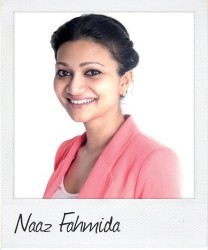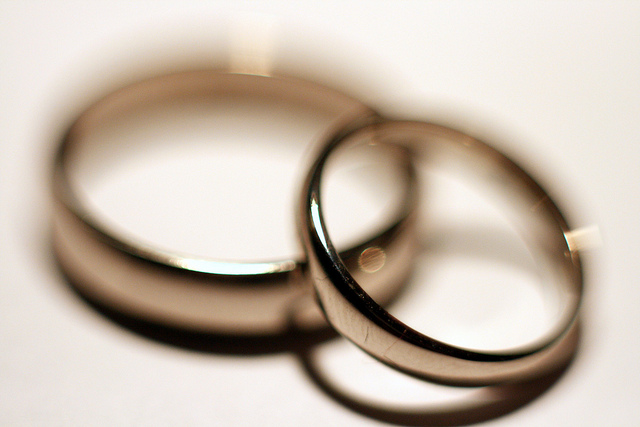"Woman power can reside in a name"
November 13th, 2013 The tradition of a woman taking her husband’s surname on marriage needs examination, writes Naaz Fahmida, 27, a Correspondent living in Dhaka, Bangladesh, who argues the custom makes identity become an issue.
The tradition of a woman taking her husband’s surname on marriage needs examination, writes Naaz Fahmida, 27, a Correspondent living in Dhaka, Bangladesh, who argues the custom makes identity become an issue.
When it is that-time-of-the-year again, you know, that uncomfortable time of the year, heralded by a restless feeling, accentuated by several mood swings and a pang – a pang in my lower abdomen that tends to become a knot of discomfort. It is called the International Women’s Day in my calendar.
I have reservations regarding the term feminism – strong, visceral reservations. I may add that I have been branded as an anti-feminist in multiple demographics for my rather crude and often insensitive (guilty!) remarks revolving around this school of thought. I did try to be helpful by suggesting an alternative term to those nice ladies out there I had managed to rudely offend in the past, that the term they were perhaps looking for was anti-chauvinist, but to no avail. It did not deter them from treating me as their enemy and I am not exactly sure I will be making more friends through this present attempt. Yet my impertinence must be borne one last time as I unload certain things from my chest. My sardonic sense of humour too would probably not be very ladylike, after all as Oscar Wilde had once blatantly stated ‘Nothing spoils romance so much as a sense of humour in the woman.’ Based on this quote, there is nothing romantic about this piece I am afraid.
Let me cut through the rhetoric and jump straight into my assertion: Why are we still changing last names? Actually, let me rephrase. Why are respectable, college-educated, progressive women still fiddling around with their identities?
It was in the 1800s that Lucy Stone decided to stand against it as part of her battle for women’s rights in the U.S. and what had happened to her legacy? We have stoned the living daylights out of it (strictly no puns intended), that’s what, and this has happened at the hands of the so-called advanced, capable and privileged section of the population, with the United Kingdom pioneering this motion under their umbrella of common law and the rest of the educated world following suit. The clear evidence that this ridiculous arrangement had been peacefully accepted by majority of women across the world lies in the fact that it is still the norm today and anyone breaking the mould has to rather justify herself.
Women only very recently in most countries have learnt to understand that physical abuse is unacceptable, reportable if possible. Domestic violence or a forceful intercourse (despite being lawfully married) is unacceptable. Only just. Yet women across almost all demography do not seem to see a lack of reasoning behind changing their last names. Why you ask – perhaps because it is all too complicated, even if it is at the expense of their self-respect, at the expense of their individuality and what of the sexist inequality it encourages? Nothing.
Is it really that complicated to imagine a world where a person exists solely as herself and not through her aliases of a mother, sister or wife? The argument or contemplation over the fact that you inherit your patrilineal surname or whether or not your children will be able to adopt it and bear the torch of it in the future comes at a much later stage and is totally irrelevant when it comes to your own identity. Let us focus on one thing at a time. Let us grasp the true implication of the fact that if after all the progress we have made in this world, we still voluntarily change the very first thing about us people reckon with – our name – the truth unfortunately is that we choose this existence and should be willing to accept the associated complexities that come with this choice.
photo credit: comedy_nose via photopin cc
…………………………………………………………………………………………………
About me: I am an Accounting graduate and HR specialist, currently a PR and Communications person by the day. Donning my superman outfit, I invade the writing world once the clock strikes midnight!
I am Bangladeshi first, Australian second, have a fair dinkum accent and accentuated Bangali-ana, a Muslim name and inheritance. I’m a firm follower of Rama and Dharma, which makes me weak in the knees for Buddha, and I love Christmas. For everything else – you must must follow the white rabbit!”
…………………………………………………………………………………………………
Opinions expressed in this article are those of the author and do not necessarily represent the views of the Commonwealth Youth Programme. Articles are published in a spirit of dialogue, respect and understanding. If you disagree, why not submit a response?
To learn more about becoming a Commonwealth Correspondent please visit:
http://www.yourcommonwealth.org/submit-articles/commonwealthcorrespondents/
…………………………………………………………………………………………………




